Cover Song Identification¶
Cover song identification is a task of identifying when two musical recordings are derived from the same music composition. The cover of a song can be drastically different from the original recording. It can change key, tempo, instrumentation, musical structure or order, etc.
Essentia provides open-source implmentation of some state-of-the-art cover song identification algorithms. The following process-chain is required to use these algorithms.
Tonal feature extraction. Mostly used by chroma features. Here we use HPCP.
Post-processing of the features to achieve invariance (eg. key) [3].
Cross similarity matrix computation ([1] or [2]).
Local sub-sequence alignment to compute the pairwise cover song similarity distance [1].
In this tutorial, we use HPCP, ChromaCrossSimilarity and
CoverSongSimilarity algorithms from essentia.
References:
[1]. Serra, J., Serra, X., & Andrzejak, R. G. (2009). Cross recurrence quantification for cover song identification.New Journal of Physics.
[2]. Serra, Joan, et al (2008). Chroma binary similarity and local alignment applied to cover song identification. IEEE Transactions on Audio, Speech, and Language Processing.
[3]. Serra, J., Gómez, E., & Herrera, P. (2008). Transposing chroma representations to a common key, IEEE Conference on The Use of Symbols to Represent Music and Multimedia Objects.
import essentia.standard as estd
from essentia.pytools.spectral import hpcpgram
Let’s load a query cover song, true-cover reference song and a
false-cover reference song. Here we chose a accapella cover of the
Beatles track Yesterday as our query song and it’s orginal version
by the Beatles and a cover of another Beatles track Come Together by
the Aerosmith as the reference tracks. We obtained these audio files
from the covers80 dataset
(https://labrosa.ee.columbia.edu/projects/coversongs/covers80/).
Query cover song
import IPython
IPython.display.Audio('./en_vogue+Funky_Divas+09-Yesterday.mp3')
Reference song (True cover)
IPython.display.Audio('./beatles+1+11-Yesterday.mp3')
Reference song (False cover)
IPython.display.Audio('./aerosmith+Live_Bootleg+06-Come_Together.mp3')
# query cover song
query_audio = estd.MonoLoader(filename='./en_vogue+Funky_Divas+09-Yesterday.mp3', sampleRate=32000)()
true_cover_audio = estd.MonoLoader(filename='./beatles+1+11-Yesterday.mp3', sampleRate=32000)()
# wrong match
false_cover_audio = estd.MonoLoader(filename='./aerosmith+Live_Bootleg+06-Come_Together.mp3', sampleRate=32000)()
Now let’s compute Harmonic Pitch Class Profile (HPCP) chroma features of these audio signals.
query_hpcp = hpcpgram(query_audio, sampleRate=32000)
true_cover_hpcp = hpcpgram(true_cover_audio, sampleRate=32000)
false_cover_hpcp = hpcpgram(false_cover_audio, sampleRate=32000)
plotting the hpcp features
%matplotlib inline
import matplotlib.pyplot as plt
fig = plt.gcf()
fig.set_size_inches(14.5, 4.5)
plt.title("Query song HPCP")
plt.imshow(query_hpcp[:500].T, aspect='auto', origin='lower', interpolation='none')
<matplotlib.image.AxesImage at 0x7f8cd0ca2650>
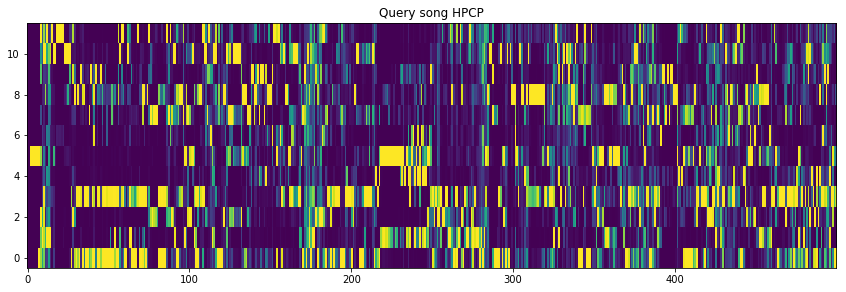
Next steps are done using the essentia ChromaCrossSimilarity
function,
Stacking input features
Key invariance using Optimal Transposition Index (OTI) [3].
Compute binary chroma cross similarity using cross recurrent plot as described in [1] or using OTI-based chroma binary method as detailed in [3]
crp = estd.ChromaCrossSimilarity(frameStackSize=9,
frameStackStride=1,
binarizePercentile=0.095,
oti=True)
true_pair_crp = crp(query_hpcp, true_cover_hpcp)
fig = plt.gcf()
fig.set_size_inches(15.5, 5.5)
plt.title('Cross recurrent plot [1]')
plt.xlabel('Yesterday accapella cover')
plt.ylabel('Yesterday - The Beatles')
plt.imshow(true_pair_crp, origin='lower')
<matplotlib.image.AxesImage at 0x7f8cd0bee290>
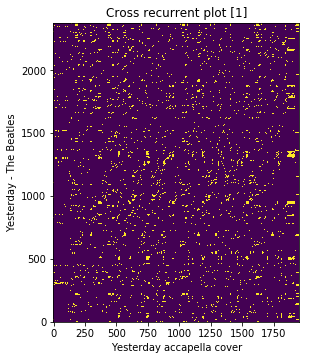
Compute binary chroma cross similarity using cross recurrent plot of the non-cover pairs
crp = estd.ChromaCrossSimilarity(frameStackSize=9,
frameStackStride=1,
binarizePercentile=0.095,
oti=True)
false_pair_crp = crp(query_hpcp, false_cover_hpcp)
fig = plt.gcf()
fig.set_size_inches(15.5, 5.5)
plt.title('Cross recurrent plot [1]')
plt.xlabel('Come together cover - Aerosmith')
plt.ylabel('Yesterday - The Beatles')
plt.imshow(false_pair_crp, origin='lower')
<matplotlib.image.AxesImage at 0x7f8cd0b66ad0>
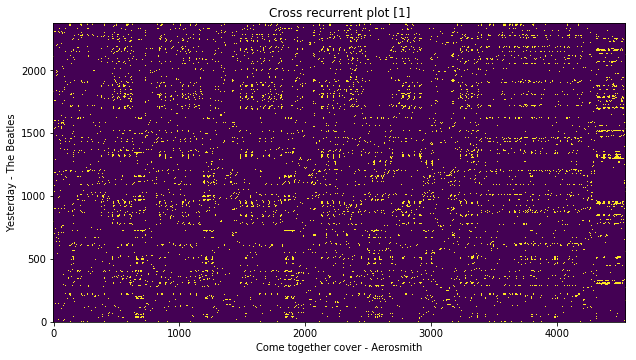
Alternatively, you can also use the OTI-based binary similarity method as explained in [2] to compute the cross similarity of two given chroma features.
csm = estd.ChromaCrossSimilarity(frameStackSize=9,
frameStackStride=1,
binarizePercentile=0.095,
oti=True,
otiBinary=True)
oti_csm = csm(query_hpcp, false_cover_hpcp)
fig = plt.gcf()
fig.set_size_inches(15.5, 5.5)
plt.title('Cross similarity matrix using OTI binary method [2]')
plt.xlabel('Come together cover - Aerosmith')
plt.ylabel('Yesterday - The Beatles')
plt.imshow(oti_csm, origin='lower')
<matplotlib.image.AxesImage at 0x7f8cd0b38e50>
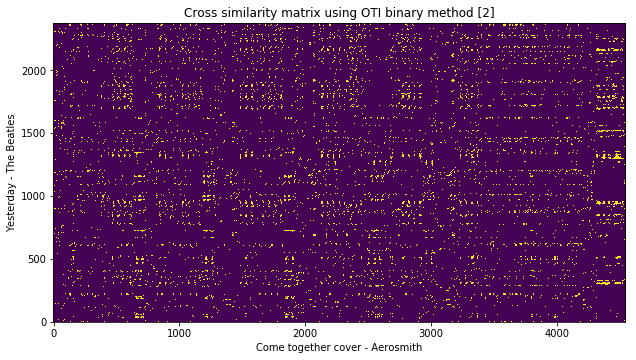
Finally, we compute an asymmetric cover song similarity measure from the pre-computed binary cross simialrity matrix of cover/non-cover pairs using various contraints of smith-waterman sequence alignment algorithm (eg.
serra09orchen17).
Computing cover song similarity distance between ‘Yesterday - accapella cover’ and ‘Yesterday - The Beatles’
score_matrix, distance = estd.CoverSongSimilarity(disOnset=0.5,
disExtension=0.5,
alignmentType='serra09',
distanceType='asymmetric')(true_pair_crp)
fig = plt.gcf()
fig.set_size_inches(15.5, 5.5)
plt.title('Cover song similarity distance: %s' % distance)
plt.xlabel('Yesterday accapella cover')
plt.ylabel('Yesterday - The Beatles')
plt.imshow(score_matrix, origin='lower')
<matplotlib.image.AxesImage at 0x7f8cd0aae310>
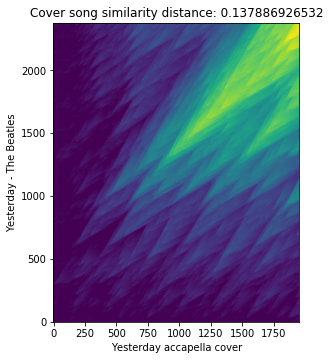
print('Cover song similarity distance: %s' % distance)
Cover song similarity distance: 0.137886926532
Computing cover song similarity distance between
Yesterday - accapella cover and
Come Together cover - The Aerosmith.
score_matrix, distance = estd.CoverSongSimilarity(disOnset=0.5,
disExtension=0.5,
alignmentType='serra09',
distanceType='asymmetric')(false_pair_crp)
fig = plt.gcf()
fig.set_size_inches(15.5, 5.5)
plt.title('Cover song similarity distance: %s' % distance)
plt.xlabel('Yesterday accapella cover')
plt.ylabel('Come together cover - Aerosmith')
plt.imshow(score_matrix, origin='lower')
<matplotlib.image.AxesImage at 0x7f8cd0a1b390>
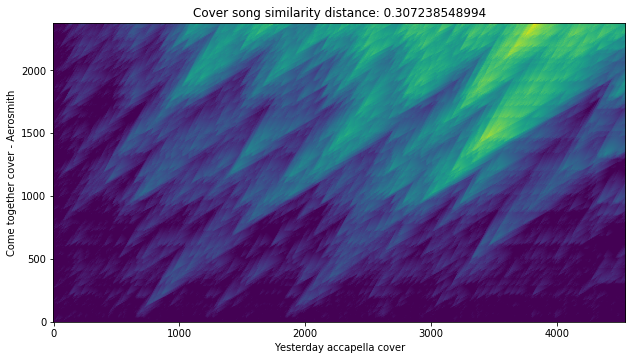
print('Cover song similarity distance: %s' % distance)
Cover song similarity distance: 0.307238548994
Voila! We can see that the cover similarity distance is quite low for the actual cover song pairs as expected.